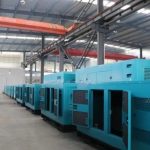Maximizing Efficiency and Reliability with Diesel Generators for Rapid Load Acceptance
Introduction In today's fast-paced world, electricity plays a crucial role in powering various industries, businesses, and households. Ensuring a stable and reliable power supply is essential to prevent disruptions and downtime that can have significant economic and social impacts. Diesel generators are a popular choice for providing backup power during outages or as a primary power source in areas with unreliable grid connections. One key advantage of diesel generators is their ability to rapidly accept loads, making them ideal for applications where quick response times are essential. In this article, we will explore the importance of rapid load acceptance in diesel generators, its benefits, challenges, and best practices for maximizing efficiency and reliability. Importance of Rapid Load Acceptance Rapid load acceptance refers to the ability of a generator to quickly respond to changes in power demand. In many applications, sudden spikes or fluctuations in load can occur due to various factors such as starting large motors, switching on equipment, or other operational changes. Diesel generators with rapid load acceptance capabilities can adjust their output almost instantaneously to meet these changing demands, ensuring a stable power supply without disruptions. The ability to rapidly accept loads is particularly critical in industries where downtime can result in significant financial losses, such as data centers, hospitals, manufacturing facilities, and telecommunications infrastructure. In these applications, even a brief interruption in power supply can lead to equipment damage, data loss, or compromised safety. Diesel generators that can quickly ramp up their output to match sudden load changes provide a reliable backup power source, minimizing the risk of downtime and ensuring continuous operations. Benefits of Rapid Load Acceptance in Diesel Generators 1. Improved Reliability: Diesel generators with rapid load acceptance capabilities enhance the reliability of the power supply by responding quickly to changes in demand. This ensures uninterrupted power delivery, reducing the risk of downtime and associated costs. 2. Enhanced Performance: Rapid load acceptance allows diesel generators to efficiently meet sudden spikes in load without compromising performance. This is especially important in applications where consistent power supply is critical for operations. 3. Fuel Efficiency: By adjusting their output in real-time to match load requirements, diesel generators with rapid load acceptance can operate more efficiently, optimizing fuel consumption and reducing operating costs. 4. Extended Equipment Life: Rapid load acceptance helps minimize stress on the generator components by ensuring smooth transitions between different load levels. This can contribute to extending the lifespan of the equipment and reducing maintenance requirements. Challenges and Considerations While rapid load acceptance offers numerous benefits, there are some challenges and considerations to keep in mind when implementing diesel generators with this capability: 1. Engine Design: The design of the diesel engine plays a crucial role in determining the generator's ability to accept rapid load changes. Engines with advanced control systems, high-performance fuel injection systems, and optimized combustion processes are better equipped to respond quickly to load variations. 2. Oversizing: Oversizing the generator can impact its ability to rapidly accept loads, as larger generators may have slower response times compared to appropriately sized units. It is essential to carefully assess the power requirements and select a generator that can efficiently handle both base load and peak load conditions. 3. Control System: The control system of the generator plays a key role in managing load acceptance and ensuring smooth transitions between different load levels. Advanced control systems with real-time monitoring and adaptive algorithms can optimize performance and efficiency. Best Practices for Maximizing Efficiency and Reliability To maximize the efficiency and reliability of diesel generators with rapid load acceptance capabilities, consider the following best practices: 1. Regular Maintenance: Proper maintenance is essential to ensure the optimal performance of the generator, including its load acceptance capabilities. Schedule regular inspections, fuel system checks, and engine tuning to keep the generator in top condition. 2. Load Testing: Conduct regular load testing to simulate real-world scenarios and evaluate the generator's response to varying loads. This helps identify any performance issues and allows for adjustments to be made to improve load acceptance. 3. Fuel Quality: The quality of fuel used in the generator can impact its performance and efficiency. Ensure that the fuel meets the manufacturer's specifications and is stored properly to prevent contamination or degradation. 4. Training and Monitoring: Provide training for operators on how to effectively manage the generator, monitor its performance, and respond to load changes. Implement remote monitoring systems to track the generator's operation and performance in real-time. Conclusion Diesel generators with rapid load acceptance capabilities are essential for ensuring a stable and reliable power supply in applications where quick response times are critical. By responding swiftly to https://www.lkpowerplant.com/60kw-150kw/ in load demand, these generators minimize the risk of downtime, enhance performance, and optimize fuel efficiency. To maximize the efficiency and reliability of diesel generators with rapid load acceptance, it is important to consider factors such as engine design, control systems, maintenance practices, and fuel quality. By following best practices and implementing proactive measures, operators can ensure that their diesel generators are well-equipped to meet the demands of modern power systems and provide uninterrupted power supply when it is needed most. 